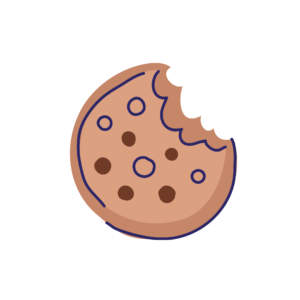I dropped my dance bag right inside of my front door, and it all of a sudden hit me. My body went from zero to hangry REAL quick. I was all of a sudden at the very bottom of the hunger and fullness scale. You know what I mean, the irritable emotions, feeling exhausted, lacking energy, empty stomach, a slight headache, and that feeling that I could eat whatever is in front of me. I end up heating up some leftovers, followed by a bowl of cereal, some trail mix, an apple, and chocolate. It seems like I can’t get full until I hit this point where I feel really uncomfortable from eating too much.
Does that scenario sound familiar to you?
I was so used to not listening to my hunger and fullness cues, that it felt like my body was constantly in a pendulum. There was never a happy medium.
When I was first introduced to Intuitive Eating, I heard about the hunger and fullness scale. “Great”, I thought, “another thing to keep track of, and I don’t even know when I’m hungry or full until it’s blatantly obvious”. With time, I learned how this scale isn’t a rule or a restriction, but a tool that we can use to gauge hunger and fullness levels and discover any correlations between the amount we eat, when we eat, and what we eat with what food decisions we make and what cravings we have.
The hunger and fullness scale I am referencing is taken directly from Evelyn Tribole and Elyse Resch’s book on Intuitive Eating. I will have a link to their book down below, and seriously, this book has been so helpful the past few years on my Intuitive Eating Journey.
Okay, so let’s talk about this hunger and fullness scale.
0 empty
1 ravenous
2 hangry
3 ready to eat
4 pangs
5 neutral
6 getting there
7 satisfied
8 full
9 stuffed
10 sick
On the left side of the scale (near zero), is when you feel completely empty and depleted. This is usually accompanied by our worst hunger cues and probably some not so savory emotions. Obviously, we don’t want to wait to eat until we reach this point. At the 1-2 mark is a ravenous hunger level. You could probably settle for any food, regardless of if it was something you really wanted, and we are also likely to be so hungry that we often will swing in the opposite direction and blow way past our fullness cues.
Around the 3-4 level of hunger is when we start to see the signs of hunger set in. We feel ready to eat food, but we still feel like we can eat mindfully and make food decisions based on what we are actually craving and need, and not just based on what is in front of us. This is ideally the point where we want to consume a meal or snack before we get into that hunger danger zone.
If you struggle with noticing your more subtle hunger cues, try to be conscious of not going more than five waking hours without eating.
It is helpful before and during meals to pause and notice your hunger levels and hunger cues. Are there any patterns with your eating habits and times that you tend to get hungry? Is there a correlation between how much you ate or what foods you ate and how long you went without getting hungry again? You might notice that the farther you end up on the hunger scale, the higher your fullness level is likely to end up at when you finish eating. Deprivation and restriction are key factors in backlash eating. So, when you honor your hunger, it’s easier to honor your fullness.
You might also notice that your hunger levels change from day to day. If you have a day off after a grueling performance weekend, it’s totally normal to be really hungry and feel like you need to eat more than what you normally need on a day without major physical activity. Your body is always striving to maintain equilibrium, so it might be just trying to play catch up, so make sure to continue to honor your hunger even if you feel like you “shouldn’t” be hungry.
The neutral point.
The midpoint on the hunger and fullness scale is a neutral point. You might not feel necessarily hungry or full, and food might not even cross your mind. If you eat at this point, you might notice that you aren’t as interested in what you are eating. Of course it’s okay to eat if you aren’t totally hungry – it’s just information and data to collect!
Fullness side of the scale
Towards the right side of the hunger and fullness scale helps us gauge our fullness levels. The 6-7 mark is when we feel content with our fullness level. Your stomach might feel pleasantly filled and food might start to lose its initial satisfaction with each bite. Ideally this is the fullness level when we are ready to finish eating. If we still have food on our plate, you can save it for later and eat it when you are hungry again. If you have finished your plate and you haven’t reached this point, it’s totally fine to get more food!
When you find yourself nearing this point, take a second and pause to check your fullness level and how your body feels. Satiety can feel different to different people, you might feel stomach fullness, satisfaction, or even just nothingness. Your stomach might have expanded a little bit, and if you had any hangry feelings before you started eating, you might feel pleasant and more calm and happy instead.
At level 8, this is when we are full and might start to feel a little uncomfortable and maybe a bit lethargic. 9 is when we are stuffed, food probably isn’t actually satisfying your taste buds anymore, and we might be at this point by overcompensating if we were super hungry before we started eating, or if we are using food as a comfort or coping mechanism. At a 10, this is when we feel sick and very uncomfortable after overfilling our bodies.
making peace with fullness
Now, I want to make it clear that it is totally fine to eat past your fullness level, especially as you adjust to a more intuitive and less restrictive style of eating. It is not something to feel guilty about or beat yourself up over. If you are finding yourself continually at the 8-10 mark after eating, it might be helpful to talk to a nutrition profession about what you are experiencing, what emotions are present, and how you are honoring your hunger. If you are struggling to identify your fullness cues, it might help to eat without distraction so that you can check in with your body periodically during meals and snacks to see where your fullness and satiety levels are at. This doesn’t have to be every meal, but it is a helpful tool for when you need it.
As I mentioned before, we are more likely to blow past our fullness level when we have been restricting food, if we aren’t honoring our hunger when our body is telling us it needs food, or we are not giving ourselves unconditional permission to eat. When you truly feel satisfied with your eating experience, by honoring what your body wants, and not forcing yourself to eat just an apple when you need something more substantial, you might find that you are able to honor your fullness and that you are not continually going back to the kitchen to find satisfaction.
Dancers have several unique challenges when it comes to honoring hunger cues. You might not get a positive look from your director or teacher if you pull out a snack in the middle of a class or rehearsal, and you might not always be able to eat a large, filling meal in the middle of a long day of rehearsals or performances.
So, what can dancers do?
Planning ahead is key! If it suits your body, try having a filling, balanced breakfast in the morning. This could be something like a hearty bowl of oatmeal, eggs with toast, a smoothie bowl, or a veggie hash. For the day, bring snacks and lunches to the studio that are easy to eat and aren’t just snack foods. Even if you have to eat your lunch in several portions, having a quinoa salad, a sandwich or wrap, grain bowl, sushi, etc. are easy to eat and provide energy and are also filling without making you feel overly stuffed.
Make sure to also pack snacks like fruit and nut butter, yogurt and granola, cheese and crackers, or hummus and veggies. These are all easy to prepare and quick to eat as well. Remember the dinner predicament that I always experienced that I mentioned at the beginning? For dinner, I learned to have a satisfying meal or meal components already prepared to give myself variety depending on what I was craving after dance. If I wanted to add something extra like toasted almonds, sliced avocado, or extra chickpeas, I can add it quickly to make my dinner more satisfying.
Physical activity can also stifle our hunger cues.
This is why it’s so easy for dancers to not eat much during the day and feel fine, but come home and immediately realize that they have 30 seconds until they get a shovel to funnel food into their mouth. So, this is important to recognize when you are dancing. Even if you aren’t necessarily hungry, if you are on a break and it has been several hours since you last ate, try to eat a little something and monitor how your stomach feels and how your energy levels are. It’s usually better to take a few extra bites then to realize 10 minutes into your next rehearsal that your stomach is trying to play along with the music.
I hope this was able to give you some insight into what the heck a hunger and fullness scale is, and how paying some extra attention to our emotions and our stomach can help us not get to the point where we need to eat everything now or we need to lie down because we are so full. As you progress with Intuitive Eating, you might find that you don’t necessarily need to use the hunger and fullness scale at every meal. Listening to your body’s cues becomes second nature! In the beginning, it’s going to be totally normal to go past your hunger and fullness limits, and that’s okay! It’s a learning experience and something that you can use to identify patterns in the future.
Make sure you check out my video on the Intuitive Eating hunger and fullness scale below. I have so many other videos on the What Fuels a Dancer YouTube channel where I talk about balanced nutrition for dancers. If you have any questions, please feel free to leave a comment and I would love to talk more with you here!
Intuitive Eating: A Revolutionary Program That Works
https://www.amazon.com/Intuitive-Eating-Revolutionary-Program-Works/dp/1250004047/ref=dp_ob_title_bk




